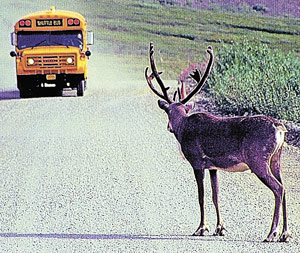Wildlife photographer, activist speaks at CEU for Earth Day

This archived article was written by: Heather Myers
The negative effects of oil drilling in the Arctic National Wildlife Refuge is the main topic of CEU student, Ivan White’s discussion for Earth Day. He will also be speaking at the University of Utah and Utah Valley State College.
He will talk at CEU at 4 p.m. on April 21 in the JLSC Alumni Room. Later that week, he will speak at UVSC on April 20 and at the U of U on April 22, Earth Day.
White has visited Alaska 19 times and feels strongly that the wildlife refuge should be left as it is. He grew up in Oklahoma and “just love[s] the outdoors.” He claims that everything he has done in his life, joining the Navy, going to school, getting married, was a search for wilderness. “I finally found what I was looking for when I went to Alaska. The ANWR is the last real wilderness left,” said White.
Another cause for White’s concern is the Gwich’in Indians who live in the area. The Gwich’in live off the caribou. They hunt them for food, and their religion is based on them. Gwich’in literally translates to caribou people. According to White, “They are one of the few tribes that have completely rejected federal aid. They rejected the Alaska Land’s Act and retained their traditional ways.”
The caribou that the Gwich’in hunt use the coastal plains of the ANWR for their calving lands as it is the only place on their migratory route that has enough nutritious vegetation for pregnant cows and newborn calves. It is reported that a five percent drop in the yearly offspring would be the end of the heard.
According to White, males will face humans, but female caribou are much more skittish and if oil is drilled from the ANWR, the machinery, it will scare off the mother caribou and they will have nowhere to give birth. He claims that would be the end of the caribou and of the Gwich’in.
White has met with Sarah James, the spokesperson for the Gwich’in. She is representing the Gwich’in in a lawsuit with the U.S. government. The Gwich’in have a treaty with the governments of the U.S. and Canada to protect the caribou and feel allowing oil to be drilled is a violation of that treaty.
Surveyors have claimed anywhere from two- to nine-billion gallons of oil could be pulled from the ANWR.




